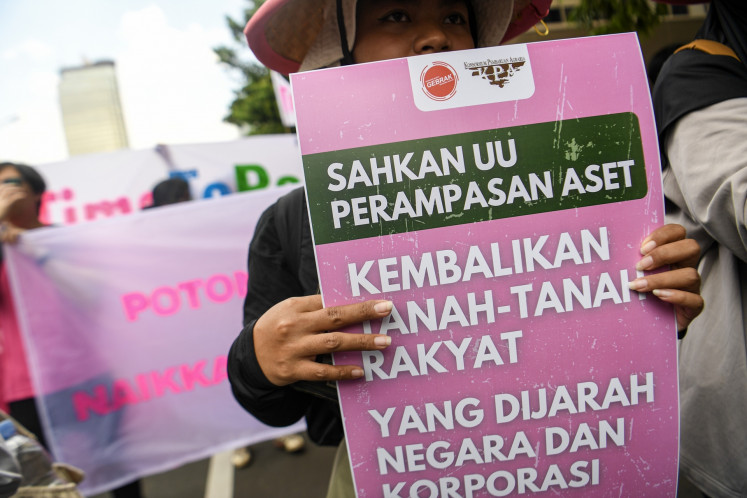Popular Reads
Top Results
Can't find what you're looking for?
View all search resultsPopular Reads
Top Results
Can't find what you're looking for?
View all search resultsE-invoice rule could discourage transactions
As part of the government’s drive to increase the number of taxpayers and eventually boost tax revenue, the Directorate General of Taxation has issued a regulation requiring non-retail business entities to identify their buyers when issuing electronic invoices (e-invoices)
Change text size
Gift Premium Articles
to Anyone
A
s part of the government’s drive to increase the number of taxpayers and eventually boost tax revenue, the Directorate General of Taxation has issued a regulation requiring non-retail business entities to identify their buyers when issuing electronic invoices (e-invoices).
The regulation was supposed to take effect in December, however, it was delayed until April 1 to give the public time to fully understand the rule.
Despite the delay, tax analysts and businesses fear the rule could discourage people from making transactions when it takes effect.
The tax office stated the regulation, which requires any taxable business entity to name the citizenship identity number (NIK) or passport number of their buyer on an e-invoice, was for the sake of transparency.
Center for Indonesia Taxation Analysis executive director Yustinus Prastowo said the regulation could hamper the economy when it takes effect, especially when the government has projected economic growth at 5.4 percent.
“The government should focus on economic growth, besides pursuing tax revenue. Otherwise, it would cause poverty and inequality in the country,” Yustinus told The Jakarta Post, adding that the new policy could discourage people from trading.
The tax office is set to implement the policy on April 1, as stipulated under PER/31/2017 on procedures for creating and reporting e-invoices.
The policy makes it compulsory for non-retail taxable businesses to include the citizenship identity numbers of individual buyers who do not have taxpayer registration numbers (NPWP).
Non-retail taxable businesses comprise wholesalers that do not sell directly to end-users, as stipulated in regulation PER-58/PJ/2010.
Meanwhile, according to Finance Ministerial Decree No. 197/PMK.03/2013, a business with total sales of Rp 4.8 billion (US$357,600) a year is considered taxable. However, many have not registered their businesses despite meeting the criteria.
Tax office spokesman Hestu Yoga Saksama said the government was concerned that dozens of companies claim they do not have NPWP numbers despite having billions of rupiah in transactions.
“We know that this issue has been going on for a long time. With the regulation [PER-31/PJ/2017], a company can only issue an e-invoice once they identify [their buyer]. If they cannot identify their buyer, our system will prevent the company from creating an e-invoice,” Hestu told reporters recently.
Public resistance toward taxation is relatively high with many unwilling to provide their NPWP numbers or personal details, he added.
Yustinus said the government’s approach may put tax compliant businesses in a dilemma.
“Say if a buyer declined to provide their NIK to a compliant business, the buyer may instead buy from an unregistered company or the black market that does not require the NIK,” said Yustinus.
He underlined that the government should improve its current taxation system, otherwise companies would opt to evade taxes by creating smaller business units with less than Rp 4.8 billion in transactions.
Meanwhile, Chamber of Commerce and Industry vice chairman of taxation Herman Juwono said the regulation should be implemented step-by-step.
“The government could possibly impose the policy on transactions worth say Rp 100 million this year. It could subsequently impose it on transactions with lower value such as Rp 75 to 50 million the year after,” Herman told the Post.
Moreover, CORE Indonesia director Mohammad Faisal said the government’s aggressive approach in boosting tax revenue was increasingly worrying the public.
“The emergence of new taxation policies may lead businesses to put their money in banks instead,” he said.
Earlier last week Finance Minister Sri Mulyani Indrawati announced that Rp 1.34 quadrillion in taxes had been collected by year-end, or 91 percent of the Rp 1.45 quadrillion target as set in the 2017 state budget (APBN).
Meanwhile, in the 2018 APBN, the tax office targeted Rp 1,62 quadrillion in tax revenue, according to data from its website. (fny)










